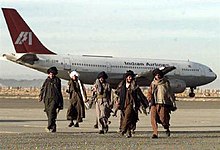
Back الخطوط الجوية الهندية الرحلة 814 Arabic Indian-Airlines-Flug 814 German Vuelo 814 de Indian Airlines Spanish پرواز شماره ۸۱۴ ایندین ایرلاینز Persian Indian Airlinesin lento 814 Finnish Vol Indian Airlines 814 French טיסה 814 של אינדיאן איירליינס HE इण्डियन एयरलाइंस फ्लाइट ८१४ Hindi Indian Airlines Penerbangan 814 ID Volo Indian Airlines 814 Italian
 Taliban men in front of the hijacked plane in Kandahar | |
| Hijacking | |
|---|---|
| Date | 24 December 1999 – 31 December 1999 |
| Site | Hijacked in Indian airspace between Kathmandu, Nepal and Delhi, India; landed at Amritsar, India; Lahore, Pakistan; Dubai, United Arab Emirates; and Kandahar, Afghanistan. |
| Aircraft | |
| Aircraft type | Airbus A300B2-101 |
| Operator | Indian Airlines |
| Registration | VT-EDW |
| Flight origin | Tribhuvan International Airport Kathmandu, Nepal |
| 1st stopover | Raja Sansi Airport, Amritsar, India |
| 2nd stopover | Lahore Airport, Pakistan |
| 3rd stopover | Al Minhad Air Base, Dubai, UAE |
| Last stopover | Kandahar Airport, Afghanistan |
| Destination | Indira Gandhi International Airport Delhi, India |
| Occupants | 191 |
| Passengers | 176 (including 5 hijackers) |
| Crew | 15 |
| Fatalities | 1 |
| Injuries | 17 |
| Survivors | 190 |
Indian Airlines Flight 814, commonly known as IC 814, was an Indian Airlines Airbus A300 en route from Tribhuvan International Airport in Kathmandu, Nepal, to Indira Gandhi International Airport in Delhi, India, on Friday, 24 December 1999, when it was hijacked and was flown to several locations before landing in Kandahar, Afghanistan.[1][2][3][4]
The aircraft was piloted by 37-year-old Captain Devi Sharan and first officer Rajinder Kumar, with 58-year-old flight engineer Anil Kumar Jaggia. The Airbus was hijacked by five masked Pakistani militants of the Harkat-ul-Mujahideen[a] (HuM) shortly after it entered Indian airspace at about 17:30 IST. The hijackers ordered the aircraft to be flown to a series of locations: Amritsar, Lahore, and across the Persian Gulf to Dubai. The hijackers finally forced the aircraft to land in Kandahar, Afghanistan, which at the time was controlled by the Taliban. The hijackers released 27 of 176 passengers in Dubai but fatally stabbed one and wounded several others.
At that time, most of Afghanistan, including the Kandahar airport where the hijacked plane landed, was under Taliban control. Taliban militiamen fighters encircled the aircraft to prevent any Indian military intervention,[6][7] which was found by current National Security Advisor Ajit Doval when he landed there. They also found two Inter-Services Intelligence (Pakistan) officers were on the apron and others soon joined them; one was a lieutenant colonel and the other a major. Doval said that if the hijackers did not have ISI support, India could have resolved the crisis.[4]
The motive for the hijacking was to secure the release of Islamist terrorists held in prison in India – fellow HuM members Ahmed Omar Saeed Sheikh and Masood Azhar, and a Pakistani backed Kashmiri militant, Mushtaq Ahmed Zargar. The hostage crisis lasted for seven days and ended after India agreed to release the three terrorists. The three have since been implicated in other terrorist actions, such as the 2001 Indian Parliament attack, 2002 kidnapping and murder of Daniel Pearl, 2008 Mumbai terror attacks, 2016 Pathankot attack and the 2019 Pulwama attack.[8]
The hijacking has been seen as one of the millennium attack plots in late December 1999 and early January 2000 by al-Qaeda-linked terrorists.[9][10][11]
- ^ "Hijacking Stunt of Air India Aircraft". Defence Journal. Archived from the original on 17 May 2000.
- ^ "India wanted to raid IC-814 in Dubai, but Farooq Abdullah opposed swap, says former RAW chief AS Dulat". The Indian Express. 3 July 2015. Archived from the original on 5 June 2018. Retrieved 27 May 2018.
- ^ "Govt pressurised negotiators to end IC-814 hijacking by Dec 31: Doval". The Hindu. 1 January 2010. Archived from the original on 26 February 2020. Retrieved 27 May 2018.
- ^ a b Dhawan, Himanshi (2017). "ISI backed Kandahar hijackers: Plane crisis negotiator Ajit Doval". The Economic Times. Archived from the original on 28 May 2018. Retrieved 27 May 2018.
- ^ Harakat-ul-Mujahedeen. Center for International Security and Cooperation. Foreign Service Institute. Stanford University.
- ^ Cite error: The named reference
taillonwas invoked but never defined (see the help page). - ^ Cite error: The named reference
Rohanwas invoked but never defined (see the help page). - ^ "Omar Sheikh sentenced to death in Pearl murder case". Rediff.com. 15 July 2007. Archived from the original on 30 July 2017. Retrieved 7 May 2020.
- ^ "Other Millennium Attacks". PBS Frontline. 25 October 2001. Archived from the original on 4 September 2020. Retrieved 1 September 2017.
- ^ Riedel, Bruce O. (2012). Deadly Embrace: Pakistan, America, and the Future of the Global Jihad. Brookings Institution Press. pp. 58–59. ISBN 9780815722748. Archived from the original on 20 October 2021. Retrieved 22 October 2020.
- ^ Hiro, Dilip (2014). "War Without End: The Rise of Islamist Terrorism and Global Response". Routledge. pp. 287–288. ISBN 9781136485565. Archived from the original on 20 October 2021. Retrieved 22 October 2020.
Cite error: There are <ref group=lower-alpha> tags or {{efn}} templates on this page, but the references will not show without a {{reflist|group=lower-alpha}} template or {{notelist}} template (see the help page).
© MMXXIII Rich X Search. We shall prevail. All rights reserved. Rich X Search